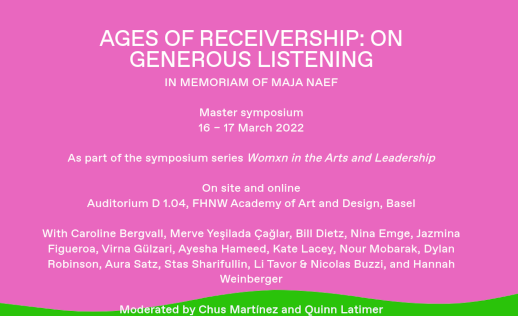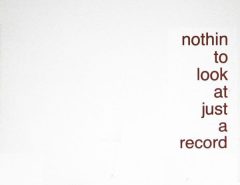
Mañana 16 y pasado 17 de marzo el Institute Art Gender de Basilea celebra el simposio Ages of Receivership: On Generous Listening. El simposio se centra en una investigación sobre las dimensiones éticas y estéticas, poéticas y políticas, de las prácticas de escucha –históricamente, sexuadas como masculinas– y una forma de entender estas prácticas tanto como una metodología como un marco ético de trabajo.
Ages of Receivership: On Generous Listening contará con la participación de Caroline Bergvall, Merve Yesilada Caglar, Bill Dietz, Nina Emge, Jazmina Figueroa, Virna Gülzari, Ayesha Hameed, Kate Lacey, Nour Mobarak, Dylan Robinson, Aura Satz, Stas Sharifullin, Li Tavor & Nicolas Buzzi, and Hannah Weinberger, y será moderado por Chus Martínez y Quinn Latimer.
“Who, if I cried out, would hear me?” So Rilke begins “The First Elegy” in his Duino Elegies, in which he ecstatically delineates his belief in being an “open receiver” to the world. “But listen to the breath, / the unbroken message that creates itself from the silence. / It rushes towards you now.” And it does, it rushes toward all of us now, in the fact of a word— listening—that is suddenly inescapable, continually coined and communicated and traded, and in the form of a multitude of practices—artistic, ecological, activist, technological, theoretical, pedagogical—in which listening is both methodology and ethical framework. So it is that we have come to call the spring master symposium at the Institute Art Gender Nature, in Basel, Ages of Receivership: On Generous Listening. Held over the course of two days, 16 and 17 March 2022, the symposium will be devoted to forms and ethics of listening—at once active, deep, decolonial, generous, public, poetic, or otherwise—and how they are entangled with aspects and ideas of poetics, coloniality, gender, spectatorship, critique, and nonhuman worlds.
Is listening a form of both poetics and political action? It is. Moreover, it is often employed as an ethical engagement with pedagogy and cultural critique. While hearing has, until recently, often been described as a passive act, listening is broadly understood as an active way of engaging with the other, with oneself and with nature. If certain assumptions subscribe listening and storytelling to womxn and elders, the broadcasted voice—all agency and production and new technologies—is often gendered as male. This symposium will address such ancient and recent ideas about the politics and gender of sound, through histories and performances of audio, and technologies of communication and reception, while addressing listening as a key methodology in reaching goals of political, ecological, and artistic equity, from decolonization and democracy building to issues of mental health. Through lectures, performances, artist talks, and conversations, the symposium will survey current artistic practice and research engaged in creating active forms of response that begin with the receiver-speaker relationship, that is, an address to another.
El simposio podrá seguirse en directo por streaming aquí, y el programa completo puede descargarse aquí.
(((o)))




Leave a Reply
Lo siento, debes estar conectado para publicar un comentario.